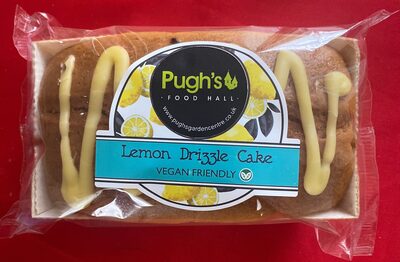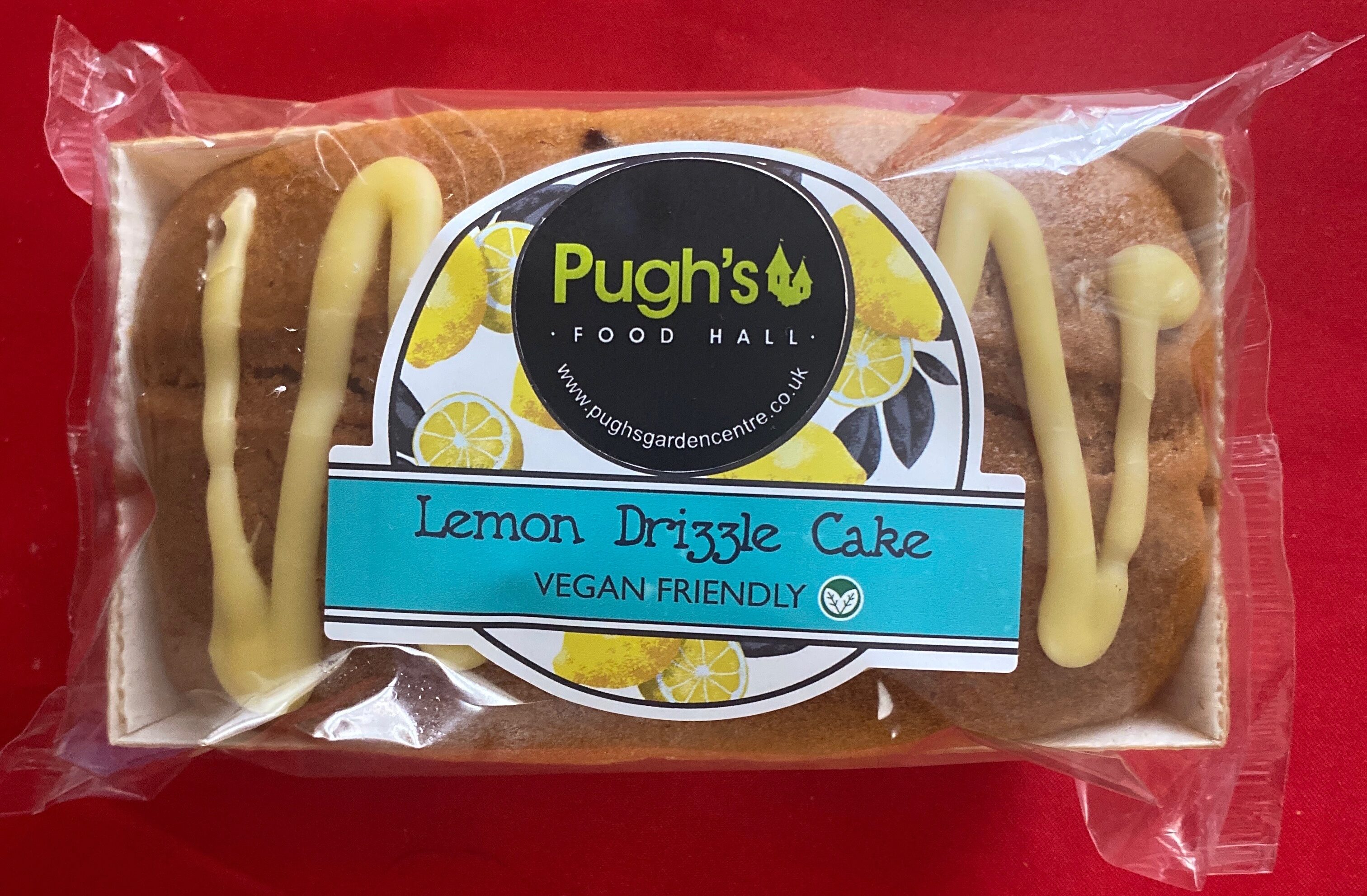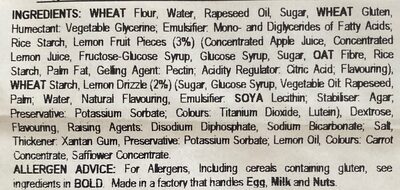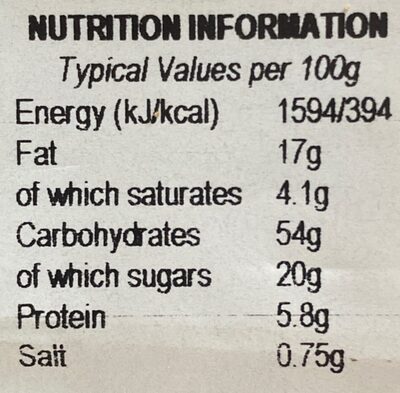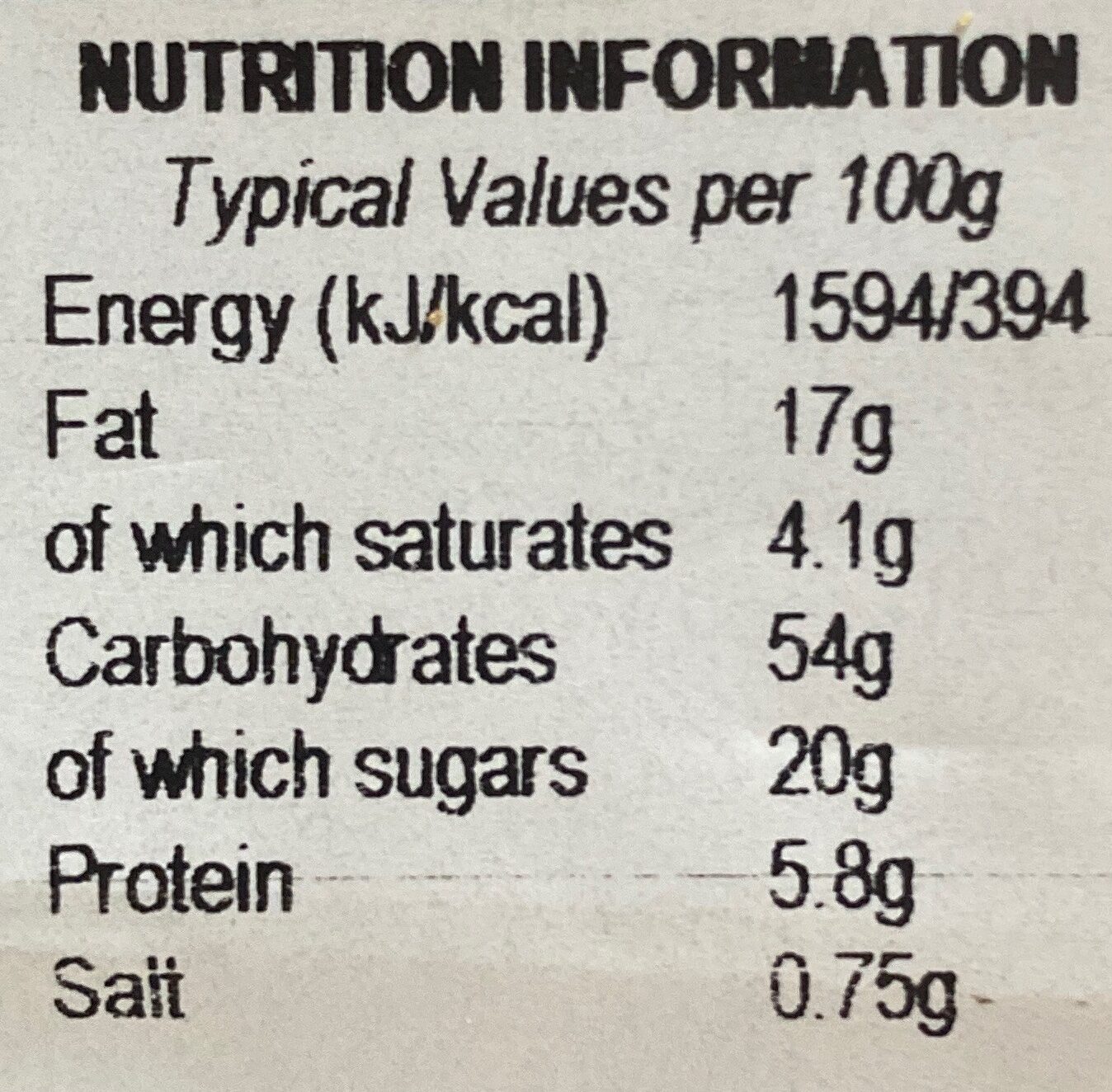Help us make food transparency the norm!
As a non-profit organization, we depend on your donations to continue informing consumers around the world about what they eat.
The food revolution starts with you!
Lemon Drizzle Cake - Pugh’s Food Hall
Lemon Drizzle Cake - Pugh’s Food Hall
This product page is not complete. You can help to complete it by editing it and adding more data from the photos we have, or by taking more photos using the app for Android or iPhone/iPad. Thank you!
×
Barcode: 5055801121695 (EAN / EAN-13)
Packaging: 1 cardboard tray to recycle, 1 plastic film
Brands: Pugh’s Food Hall
Categories: Snacks, Sweet snacks, Biscuits and cakes, Cakes, Lemon cake
Labels, certifications, awards: Vegetarian, Vegan
Countries where sold: United Kingdom
Matching with your preferences
Health
Ingredients
-
58 ingredients
WHEAT Flour, Water, Rapeseed Oil, Sugar, WHEAT Gluten, Humectant: Vegetable Glycerine, Emulsifier. Mono - and Diglycerides of Fatty Acids; Rice Starch, Lemon Fruit Pieces (3%) (Concentrated Apple Juice, Concentrated Lemon Juice, Fructose-Glucose Syrup, Glucose Syrup, Sugar, OAT Fibre, Rice Starch, Palm Fat, Gelling Agent: Pectin; Acidity Regulator. Citric Acid, Flavouring), WHEAT Starch, Lemon Drizzle (2%) (Sugar, Glucose Syrup, Vegetable Oit Rapeseed, Palm, Water, Natural Flavouring, Emulsifier SOYA Lecithin; Stabiliser. Agar, Preservative: Potassium Sorbate, Colours: Titanium Dioxide, Lutein), Dextrose, Flavouring, Raising Agents: Disodium Diphosphate, Sodium Bicarbonate, Salt, Thickener. Xantan Gum, Preservative: Potassium Sorbate; Lemon Oil, Colours: Carrot Concentrate, Safflower Concentrate. ALLERGEN ADVICE: For Allergens, Including cereals containing gluten, see ingredients in BOLD. Made in a factory that handles Egg, Milk and Nuts.Allergens: Gluten, Milk, Nuts, Soybeans
Food processing
-
Ultra processed foods
Elements that indicate the product is in the 4 - Ultra processed food and drink products group:
- Additive: E161b - Lutein
- Additive: E171 - Titanium dioxide
- Additive: E322 - Lecithins
- Additive: E406 - Agar
- Additive: E422 - Glycerol
- Additive: E440 - Pectins
- Additive: E450 - Diphosphates
- Additive: E471 - Mono- and diglycerides of fatty acids
- Ingredient: Colour
- Ingredient: Dextrose
- Ingredient: Emulsifier
- Ingredient: Flavouring
- Ingredient: Gelling agent
- Ingredient: Glucose
- Ingredient: Glucose syrup
- Ingredient: Gluten
- Ingredient: Humectant
- Ingredient: Thickener
Food products are classified into 4 groups according to their degree of processing:
- Unprocessed or minimally processed foods
- Processed culinary ingredients
- Processed foods
- Ultra processed foods
The determination of the group is based on the category of the product and on the ingredients it contains.
Additives
-
E171 - Titanium dioxide
Titanium dioxide: Titanium dioxide, also known as titaniumIV oxide or titania, is the naturally occurring oxide of titanium, chemical formula TiO2. When used as a pigment, it is called titanium white, Pigment White 6 -PW6-, or CI 77891. Generally, it is sourced from ilmenite, rutile and anatase. It has a wide range of applications, including paint, sunscreen and food coloring. When used as a food coloring, it has E number E171. World production in 2014 exceeded 9 million metric tons. It has been estimated that titanium dioxide is used in two-thirds of all pigments, and the oxide has been valued at $13.2 billion.Source: Wikipedia
-
E202 - Potassium sorbate
Potassium sorbate (E202) is a synthetic food preservative commonly used to extend the shelf life of various food products.
It works by inhibiting the growth of molds, yeast, and some bacteria, preventing spoilage. When added to foods, it helps maintain their freshness and quality.
Some studies have shown that when combined with nitrites, potassium sorbate have genotoxic activity in vitro. However, potassium sorbate is generally recognized as safe (GRAS) by regulatory authorities.
-
E322 - Lecithins
Lecithins are natural compounds commonly used in the food industry as emulsifiers and stabilizers.
Extracted from sources like soybeans and eggs, lecithins consist of phospholipids that enhance the mixing of oil and water, ensuring smooth textures in various products like chocolates, dressings, and baked goods.
They do not present any known health risks.
-
E322i - Lecithin
Lecithins are natural compounds commonly used in the food industry as emulsifiers and stabilizers.
Extracted from sources like soybeans and eggs, lecithins consist of phospholipids that enhance the mixing of oil and water, ensuring smooth textures in various products like chocolates, dressings, and baked goods.
They do not present any known health risks.
-
E330 - Citric acid
Citric acid is a natural organic acid found in citrus fruits such as lemons, oranges, and limes.
It is widely used in the food industry as a flavor enhancer, acidulant, and preservative due to its tart and refreshing taste.
Citric acid is safe for consumption when used in moderation and is considered a generally recognized as safe (GRAS) food additive by regulatory agencies worldwide.
-
E406 - Agar
Agar: Agar -pronounced , sometimes - or agar-agar is a jelly-like substance, obtained from red algae.Agar is a mixture of two components: the linear polysaccharide agarose, and a heterogeneous mixture of smaller molecules called agaropectin. It forms the supporting structure in the cell walls of certain species of algae, and is released on boiling. These algae are known as agarophytes, and belong to the Rhodophyta -red algae- phylum.Agar has been used as an ingredient in desserts throughout Asia, and also as a solid substrate to contain culture media for microbiological work. Agar can be used as a laxative, an appetite suppressant, a vegetarian substitute for gelatin, a thickener for soups, in fruit preserves, ice cream, and other desserts, as a clarifying agent in brewing, and for sizing paper and fabrics.The gelling agent in agar is an unbranched polysaccharide obtained from the cell walls of some species of red algae, primarily from tengusa -Gelidiaceae- and ogonori -Gracilaria-. For commercial purposes, it is derived primarily from ogonori. In chemical terms, agar is a polymer made up of subunits of the sugar galactose.Source: Wikipedia
-
E422 - Glycerol
Glycerol: Glycerol -; also called glycerine or glycerin; see spelling differences- is a simple polyol compound. It is a colorless, odorless, viscous liquid that is sweet-tasting and non-toxic. The glycerol backbone is found in all lipids known as triglycerides. It is widely used in the food industry as a sweetener and humectant and in pharmaceutical formulations. Glycerol has three hydroxyl groups that are responsible for its solubility in water and its hygroscopic nature.Source: Wikipedia
-
E440 - Pectins
Pectins (E440) are natural carbohydrates, predominantly found in fruits, that act as gelling agents in the food industry, creating the desirable jelly-like texture in jams, jellies, and marmalades.
Pectins stabilize and thicken various food products, such as desserts, confectioneries, and beverages, ensuring a uniform consistency and quality.
Recognized as safe by various health authorities, pectins have been widely used without notable adverse effects when consumed in typical dietary amounts.
-
E450 - Diphosphates
Diphosphates (E450) are food additives often utilized to modify the texture of products, acting as leavening agents in baking and preventing the coagulation of canned food.
These salts can stabilize whipped cream and are also found in powdered products to maintain their flow properties. They are commonly present in baked goods, processed meats, and soft drinks.
Derived from phosphoric acid, they're part of our daily phosphate intake, which often surpasses recommended levels due to the prevalence of phosphates in processed foods and drinks.
Excessive phosphate consumption is linked to health issues, such as impaired kidney function and weakened bone health. Though diphosphates are generally regarded as safe when consumed within established acceptable daily intakes, it's imperative to monitor overall phosphate consumption to maintain optimal health.
-
E471 - Mono- and diglycerides of fatty acids
Mono- and diglycerides of fatty acids (E471), are food additives commonly used as emulsifiers in various processed foods.
These compounds consist of glycerol molecules linked to one or two fatty acid chains, which help stabilize and blend water and oil-based ingredients. E471 enhances the texture and shelf life of products like margarine, baked goods, and ice cream, ensuring a smooth and consistent texture.
It is generally considered safe for consumption within established regulatory limits.
-
E500 - Sodium carbonates
Sodium carbonates (E500) are compounds commonly used in food preparation as leavening agents, helping baked goods rise by releasing carbon dioxide when they interact with acids.
Often found in baking soda, they regulate the pH of food, preventing it from becoming too acidic or too alkaline. In the culinary world, sodium carbonates can also enhance the texture and structure of foods, such as noodles, by modifying the gluten network.
Generally recognized as safe, sodium carbonates are non-toxic when consumed in typical amounts found in food.
-
E500ii - Sodium hydrogen carbonate
Sodium hydrogen carbonate, also known as E500ii, is a food additive commonly used as a leavening agent.
When added to recipes, it releases carbon dioxide gas upon exposure to heat or acids, causing dough to rise and resulting in a light, fluffy texture in baked goods.
It is generally recognized as safe (GRAS) by regulatory authorities when used in appropriate quantities and poses no significant health risks when consumed in typical food applications.
Ingredients analysis
-
Palm oil
Ingredients that contain palm oil: Palm fat, Palm
-
Vegan
No non-vegan ingredients
Unrecognized ingredients: Lemon-fruit-pieces, Lemon-drizzle, Vegetable-oit-rapeseed, Emulsifier-soya-lecithin, Xantan-gum, Made-in-a-factory-that-handles-eggSome ingredients could not be recognized.
We need your help!
You can help us recognize more ingredients and better analyze the list of ingredients for this product and others:
- Edit this product page to correct spelling mistakes in the ingredients list, and/or to remove ingredients in other languages and sentences that are not related to the ingredients.
- Add new entries, synonyms or translations to our multilingual lists of ingredients, ingredient processing methods, and labels.
If you would like to help, join the #ingredients channel on our Slack discussion space and/or learn about ingredients analysis on our wiki. Thank you!
-
Vegetarian
No non-vegetarian ingredients detected
Unrecognized ingredients: Lemon-fruit-pieces, Lemon-drizzle, Vegetable-oit-rapeseed, Emulsifier-soya-lecithin, Xantan-gum, Made-in-a-factory-that-handles-eggSome ingredients could not be recognized.
We need your help!
You can help us recognize more ingredients and better analyze the list of ingredients for this product and others:
- Edit this product page to correct spelling mistakes in the ingredients list, and/or to remove ingredients in other languages and sentences that are not related to the ingredients.
- Add new entries, synonyms or translations to our multilingual lists of ingredients, ingredient processing methods, and labels.
If you would like to help, join the #ingredients channel on our Slack discussion space and/or learn about ingredients analysis on our wiki. Thank you!
-
Details of the analysis of the ingredients
We need your help!
Some ingredients could not be recognized.
We need your help!
You can help us recognize more ingredients and better analyze the list of ingredients for this product and others:
- Edit this product page to correct spelling mistakes in the ingredients list, and/or to remove ingredients in other languages and sentences that are not related to the ingredients.
- Add new entries, synonyms or translations to our multilingual lists of ingredients, ingredient processing methods, and labels.
If you would like to help, join the #ingredients channel on our Slack discussion space and/or learn about ingredients analysis on our wiki. Thank you!
: WHEAT Flour, Water, Rapeseed Oil, Sugar, WHEAT Gluten, Humectant (Vegetable Glycerine), Emulsifier, mono- and Diglycerides of Fatty Acids, Rice Starch, Lemon Fruit Pieces 3% (Concentrated Apple Juice, Concentrated Lemon Juice, Fructose-Glucose Syrup, Glucose Syrup, Sugar, OAT Fibre, Rice Starch, Palm Fat, Gelling Agent (Pectin), Acidity Regulator, Citric Acid, Flavouring), WHEAT Starch, Lemon Drizzle 2% (Sugar, Glucose Syrup, Vegetable Oit Rapeseed, Palm, Water, Natural Flavouring, Emulsifier SOYA Lecithin, Stabiliser, Agar, Preservative (Potassium Sorbate), Colours (Titanium Dioxide), Lutein), Dextrose, Flavouring, Raising Agents (Disodium Diphosphate), Sodium Bicarbonate, Salt, Thickener, Xantan Gum, Preservative (Potassium Sorbate), Lemon Oil, Colours (Carrot Concentrate), Safflower Concentrate, Including cereals containing gluten, Made in a factory that handles Egg, Milk, Nuts- WHEAT Flour -> en:wheat-flour - vegan: yes - vegetarian: yes - ciqual_proxy_food_code: 9410 - percent_min: 3.7037037037037 - percent_max: 69
- Water -> en:water - vegan: yes - vegetarian: yes - ciqual_food_code: 18066 - percent_min: 3 - percent_max: 36
- Rapeseed Oil -> en:rapeseed-oil - vegan: yes - vegetarian: yes - from_palm_oil: no - percent_min: 3 - percent_max: 25
- Sugar -> en:sugar - vegan: yes - vegetarian: yes - ciqual_proxy_food_code: 31016 - percent_min: 3 - percent_max: 19.5
- WHEAT Gluten -> en:wheat-gluten - vegan: yes - vegetarian: yes - percent_min: 3 - percent_max: 16.2
- Humectant -> en:humectant - percent_min: 3 - percent_max: 14
- Vegetable Glycerine -> en:e422 - vegan: maybe - vegetarian: maybe - percent_min: 3 - percent_max: 14
- Emulsifier -> en:emulsifier - percent_min: 3 - percent_max: 12.4285714285714
- mono- and Diglycerides of Fatty Acids -> en:e471 - vegan: maybe - vegetarian: maybe - from_palm_oil: maybe - percent_min: 3 - percent_max: 11.25
- Rice Starch -> en:rice-starch - vegan: yes - vegetarian: yes - ciqual_proxy_food_code: 9510 - percent_min: 3 - percent_max: 10.3333333333333
- Lemon Fruit Pieces -> en:lemon-fruit-pieces - percent_min: 3 - percent: 3 - percent_max: 3
- Concentrated Apple Juice -> en:concentrated-apple-juice - vegan: yes - vegetarian: yes - ciqual_food_code: 2074 - percent_min: 0.25 - percent_max: 3
- Concentrated Lemon Juice -> en:concentrated-lemon-juice - vegan: yes - vegetarian: yes - ciqual_food_code: 2028 - percent_min: 0 - percent_max: 1.5
- Fructose-Glucose Syrup -> en:glucose-fructose-syrup - vegan: yes - vegetarian: yes - ciqual_food_code: 31077 - percent_min: 0 - percent_max: 1
- Glucose Syrup -> en:glucose-syrup - vegan: yes - vegetarian: yes - ciqual_proxy_food_code: 31016 - percent_min: 0 - percent_max: 0.75
- Sugar -> en:sugar - vegan: yes - vegetarian: yes - ciqual_proxy_food_code: 31016 - percent_min: 0 - percent_max: 0.6
- OAT Fibre -> en:oat-fiber - vegan: yes - vegetarian: yes - percent_min: 0 - percent_max: 0.5
- Rice Starch -> en:rice-starch - vegan: yes - vegetarian: yes - ciqual_proxy_food_code: 9510 - percent_min: 0 - percent_max: 0.428571428571429
- Palm Fat -> en:palm-fat - vegan: yes - vegetarian: yes - from_palm_oil: yes - ciqual_proxy_food_code: 16129 - percent_min: 0 - percent_max: 0.375
- Gelling Agent -> en:gelling-agent - percent_min: 0 - percent_max: 0.375
- Pectin -> en:e440a - vegan: yes - vegetarian: yes - percent_min: 0 - percent_max: 0.375
- Acidity Regulator -> en:acidity-regulator - percent_min: 0 - percent_max: 0.375
- Citric Acid -> en:e330 - vegan: yes - vegetarian: yes - percent_min: 0 - percent_max: 0.272727272727273
- Flavouring -> en:flavouring - vegan: maybe - vegetarian: maybe - percent_min: 0 - percent_max: 0.272727272727273
- WHEAT Starch -> en:wheat-starch - vegan: yes - vegetarian: yes - ciqual_proxy_food_code: 9510 - percent_min: 2 - percent_max: 3
- Lemon Drizzle -> en:lemon-drizzle - percent_min: 2 - percent: 2 - percent_max: 2
- Sugar -> en:sugar - vegan: yes - vegetarian: yes - ciqual_proxy_food_code: 31016 - percent_min: 0.166666666666667 - percent_max: 2
- Glucose Syrup -> en:glucose-syrup - vegan: yes - vegetarian: yes - ciqual_proxy_food_code: 31016 - percent_min: 0 - percent_max: 1
- Vegetable Oit Rapeseed -> en:vegetable-oit-rapeseed - percent_min: 0 - percent_max: 0.666666666666667
- Palm -> en:palm - vegan: yes - vegetarian: yes - from_palm_oil: yes - ciqual_food_code: 16129 - percent_min: 0 - percent_max: 0.5
- Water -> en:water - vegan: yes - vegetarian: yes - ciqual_food_code: 18066 - percent_min: 0 - percent_max: 0.4
- Natural Flavouring -> en:natural-flavouring - vegan: maybe - vegetarian: maybe - percent_min: 0 - percent_max: 0.333333333333333
- Emulsifier SOYA Lecithin -> en:emulsifier-soya-lecithin - percent_min: 0 - percent_max: 0.285714285714286
- Stabiliser -> en:stabiliser - percent_min: 0 - percent_max: 0.285714285714286
- Agar -> en:e406 - vegan: yes - vegetarian: yes - ciqual_food_code: 11084 - percent_min: 0 - percent_max: 0.285714285714286
- Preservative -> en:preservative - percent_min: 0 - percent_max: 0.2
- Potassium Sorbate -> en:e202 - vegan: yes - vegetarian: yes - percent_min: 0 - percent_max: 0.2
- Colours -> en:colour - percent_min: 0 - percent_max: 0.2
- Titanium Dioxide -> en:e171 - vegan: yes - vegetarian: yes - percent_min: 0 - percent_max: 0.2
- Lutein -> en:e161b - vegan: yes - vegetarian: yes - percent_min: 0 - percent_max: 0.2
- Dextrose -> en:dextrose - vegan: yes - vegetarian: yes - ciqual_proxy_food_code: 31016 - percent_min: 0 - percent_max: 2
- Flavouring -> en:flavouring - vegan: maybe - vegetarian: maybe - percent_min: 0 - percent_max: 2
- Raising Agents -> en:raising-agent - percent_min: 0 - percent_max: 2
- Disodium Diphosphate -> en:e450i - vegan: yes - vegetarian: yes - percent_min: 0 - percent_max: 2
- Sodium Bicarbonate -> en:e500ii - vegan: yes - vegetarian: yes - percent_min: 0 - percent_max: 2
- Salt -> en:salt - vegan: yes - vegetarian: yes - ciqual_food_code: 11058 - percent_min: 0 - percent_max: 2
- Thickener -> en:thickener - percent_min: 0 - percent_max: 2
- Xantan Gum -> en:xantan-gum - percent_min: 0 - percent_max: 2
- Preservative -> en:preservative - percent_min: 0 - percent_max: 2
- Potassium Sorbate -> en:e202 - vegan: yes - vegetarian: yes - percent_min: 0 - percent_max: 2
- Lemon Oil -> en:lemon-oil - vegan: yes - vegetarian: yes - from_palm_oil: no - ciqual_proxy_food_code: 13009 - percent_min: 0 - percent_max: 2
- Colours -> en:colour - percent_min: 0 - percent_max: 2
- Carrot Concentrate -> en:carrot-concentrate - vegan: yes - vegetarian: yes - ciqual_food_code: 20009 - percent_min: 0 - percent_max: 2
- Safflower Concentrate -> en:safflower-concentrate - vegan: yes - vegetarian: yes - percent_min: 0 - percent_max: 2
- Including cereals containing gluten -> en:cereals-containing-gluten - vegan: yes - vegetarian: yes - percent_min: 0 - percent_max: 2
- Made in a factory that handles Egg -> en:made-in-a-factory-that-handles-egg - percent_min: 0 - percent_max: 2
- Milk -> en:milk - vegan: no - vegetarian: yes - ciqual_proxy_food_code: 19051 - percent_min: 0 - percent_max: 2
- Nuts -> en:nut - vegan: yes - vegetarian: yes - percent_min: 0 - percent_max: 2
Nutrition
-
Missing data to compute the Nutri-Score
Missing nutrition facts
⚠ ️The nutrition facts of the product must be specified in order to compute the Nutri-Score.Could you add the information needed to compute the Nutri-Score? Add nutrition facts
-
Nutrition facts
Nutrition facts As sold
for 100 g / 100 mlCompared to: Lemon cake Fat ? Saturated fat ? Carbohydrates ? Sugars ? Fiber ? Proteins ? Salt ? Fruits‚ vegetables‚ nuts and rapeseed‚ walnut and olive oils (estimate from ingredients list analysis) 12.389 %
Environment
-
Eco-Score B - Low environmental impact
⚠ ️Select a country in order to include the full impact of transportation.The Eco-Score is an experimental score that summarizes the environmental impacts of food products.→ The Eco-Score was initially developped for France and it is being extended to other European countries. The Eco-Score formula is subject to change as it is regularly improved to make it more precise and better suited to each country.Life cycle analysis
-
Average impact of products of the same category: A (Score: 81/100)
Category: Lemon cake, all types
Category: Lemon cake, all types
- PEF environmental score: 0.27 (the lower the score, the lower the impact)
- including impact on climate change: 1.80 kg CO2 eq/kg of product
Stage Impact Agriculture
70.1 %Processing
16.0 %Packaging
7.1 %Transportation
5.0 %Distribution
1.8 %Consumption
0.0 %
Bonuses and maluses
-
Missing origins of ingredients information
Malus: -5
⚠ ️ The origins of the ingredients of this product are not indicated.
If they are indicated on the packaging, you can modify the product sheet and add them.
If you are the manufacturer of this product, you can send us the information with our free platform for producers.
-
Ingredients that threatens species
Malus: -10
Contains palm oil
Tropical forests in Asia, Africa and Latin America are destroyed to create and expand oil palm tree plantations. The deforestation contributes to climate change, and it endangers species such as the orangutan, the pigmy elephant and the Sumatran rhino.
-
Packaging with a low impact
Malus: -2
Shape Material Recycling Impact 1 Tray Cardboard Recycle Low 1 Film Plastic High
Eco-Score for this product
-
Impact for this product: B (Score: 64/100)
Product: Lemon Drizzle Cake - Pugh’s Food Hall
Life cycle analysis score: 81
Sum of bonuses and maluses: -17
Final score: 64/100
-
Carbon footprint
-
Equal to driving 0.9 km in a petrol car
180 g CO² per 100g of product
The carbon emission figure comes from ADEME's Agribalyse database, for the category: Lemon cake, all types (Source: ADEME Agribalyse Database)
Stage Impact Agriculture
59.8 %Processing
14.1 %Packaging
16.0 %Transportation
8.9 %Distribution
1.1 %Consumption
0.0 %
Packaging
-
Packaging with a low impact
-
Packaging parts
1 x Tray (Cardboard)
1 x Film (Plastic)
-
Packaging materials
Material % Packaging weight Paper or cardboard Plastic Total
-
Transportation
-
Origins of ingredients
Missing origins of ingredients information
⚠ ️ The origins of the ingredients of this product are not indicated.
If they are indicated on the packaging, you can modify the product sheet and add them.
If you are the manufacturer of this product, you can send us the information with our free platform for producers.Add the origins of ingredients for this product Add the origins of ingredients for this product
Threatened species
-
Contains palm oil
Drives deforestation and threatens species such as the orangutan
Tropical forests in Asia, Africa and Latin America are destroyed to create and expand oil palm tree plantations. The deforestation contributes to climate change, and it endangers species such as the orangutan, the pigmy elephant and the Sumatran rhino.
Report a problem
-
Incomplete or incorrect information?
Category, labels, ingredients, allergens, nutritional information, photos etc.
If the information does not match the information on the packaging, please complete or correct it. Open Food Facts is a collaborative database, and every contribution is useful for all.
Data sources
Product added on by baileysloan
Last edit of product page on by baileysloan.
